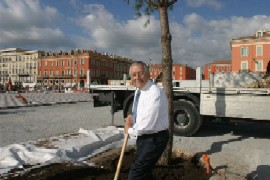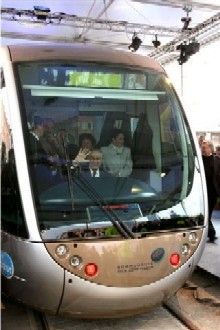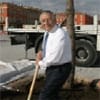Nice-Premium: 10 years in office. What is your analysis of the decade?

Jacques Peyrat: It’s a fascinating analysis. Looking back at what we’ve achieved, I realize we’re not paid for the criticism we hear. Never mind. One should not work for recognition, to make a name for oneself, or to gain a title. For me, the city of Nice is doing well. Remember when we took office in 1995, the city was in shock after the departure of its beloved mayor, Jacques Médecin. People had lost faith in Nice. The rest of France mocked us. The city was cornered by tax because it had been mismanaged. There was a significant lack of public facilities.
No one had tackled the major difficulties of the city, which were traffic and parking. The map of Nice (he points to the one in his office) clearly shows the challenge of a city with 345,000 inhabitants clustered on two plains: the Paillon valley behind the port of Nice, and the downtown area where there are 240,000 inhabitants, and 105,000 on the hills. Moreover, there is a floodplain to be capitalized, the Plaine du Var, which requires complex development. However, the good news is that Plaine du Var has benefited from the National Interest Operation label. This label, like Euromed in Marseille, will enable it to benefit from very significant state funding.
We solidly restored the finances. We paid back, and it’s very significant, more than 2.8 billion French Francs in ten years while lowering taxes and completing necessary facilities. We are the only city of over 100,000 inhabitants in France that did not raise taxes. The region would do well to take a page from our book. Then, we did the decadal urban project to study which projects should be undertaken over the next ten years. This Planning was submitted to the population who responded “yes.” So, we gradually built the projects.
The tram first. I didn’t waste a minute. In 1995 it was the first file. It took twelve years to realize this project. It’s the only way to deal with the traffic problem. It’s so much the only one that I consider, together with my fellow mayors from CANCA, extending it from east to west. 37.5 kilometers of tramway within the perimeter of CANCA, with two-thirds in Nice including connections, deviations, and park-and-ride facilities at every entry and exit where the price of parking includes a free ticket on the transport network.
Another positive result: making buses cheaper with a single fare of 1.3 euros on the CANCA network. This commitment to transport was the most important thing. There were also all the networks to be redone: the stormwater, sewage networks, and 2 large retention basins (Arson and Ferber).
There will be the fast lane from east to west. Here, users still suffer inconvenience. But I am like the surgeon who will perform a quadruple bypass, who will take risks so that afterward the patient has a brand-new heart and it works! The fast lane will become rapid. The Regional National Conservatory is an extraordinary gem. We built a great library fabulous with a touch of modernism and avant-garde on the cultural plan. Some thought, because I opposed the collective of the Blue Devils, that I was a dreadful conservative who could only read Latin in the text and listen to chamber music. It was my vote that tipped for the square head of Sosno which has become an effigy of the city of Nice. The university? After buying the buildings from the Ministry of Defense for 33 million Francs, we invested in the Saint Jean d’Angely barracks 22 million euros and then 16 million euros over several stages of work to give Nice, the fifth city of France, a first-rate university. Indeed, where there is no transmission of knowledge there is no great city or great agglomeration. It is necessary to allow the extension of the university.
We took the precaution of purchasing the temporary SPADA hangar so that it would not be sold to developers who would have built buildings on it. At Spada, we can build the hall we lack, the stage we lack to host philharmonic orchestras, rap… A very beautiful hall where all the musics can mix, whatever they are, wherever they come from, and for everyone. The city is not just a city of elderly people, or a city of young people, or a working city, it is all these things at once.

What do I take away from these 10 years? First of all, the immense work that has been accomplished, not only the work of the mayor but also that of the elected officials and civil servants because they are the memory of this city. They did a good job. We took our responsibilities; we braved unpopularity. I put my mandate at stake. I could have thought: “why so much trouble?” and given in to easy decisions by increasing the number of trees, benches, free shows, etc. Some politicians would have opted for these easy choices, but I did not choose the easy way. It’s true that I poisoned everyone for three years but we will deliver a beautiful city. Our fellow citizens will tell us. I am passionate about what I have undertaken. If the city is more beautiful, if it is so for those who come to visit us and for the people of Nice who live there, I will feel that I haven’t wasted my time.
NP: How do you judge employment in Nice and in CANCA?
Do you not think that Cyber Employment could be used more regularly to set up meetings between recruiting companies and job seekers, given that the employment fair organized by PLIE was a huge success last year?
JP: After creating the first cyber seniors and immediately after the cyber jobs, we installed the Internet in every school group, with one computer per class. In a large number of institutions there is a computer room. Next year, moreover, the entire computer park of schools will be renewed. Still, even more is needed.
Employment is the keystone of everything. Provide employment and we will have less poverty. Everyone will then be able to pay their rent and we may even appeal to the private rental park because landlords will have fewer concerns about renting their apartments. As long as there are no jobs, we do not escape from poverty, lack of housing, and deprivation. I created the local mission for employment. I set up the PLIE. I built CANCA and I try to bring in companies, by implementing a transport network to make it appealing for workers to come, and creating housing to accommodate them. Let them come to invest and create companies or subsidiaries! But they are not coming as much as our assets would allow us to hope… Why? Because we are not the capital of the region. As long as we are not taken seriously by the central government of the Republic, as long as we are the poor relatives of Marseille and Heaven knows I love Marseille and its Mayor, as long as we do not have relocations, we will not get out of it. So we must find new economic mechanisms apart from a better use of cyber to specifically answer your question.
NP: So, making Nice a regional capital could be one of your projects?
JP: I have not succeeded, sir. It’s over.
NP: Is it a regret?
JP: Oh yes.
NP: Is it impossible?
JP: Listen, when I went to see the Prime Minister, it was Alain Juppé, he informed me that the decision could not be positive. Why? Because the trend in Europe is towards large regions. I will tell you something that will be engraved in stone: one day there will be a Nice-Marseille-Lyon-Geneva-Turin region.
Not Barcelona because Barcelona is far too strong. Catalonia sustains all of Spain. That is not quite our case. Barcelona is even a competitor.
In proposing to Mr. Juppé to split the region in two by removing a department and a half or three-quarters (the Alpes Maritimes, part of the Var, the Alpes de Haute Provence and the Hautes-Alpes: i.e., the old County of Nice), I was not in the spirit of the times. But we suffer from not being a regional capital. For we are only the 27th city in France administratively speaking.
NP: You hope a lot for the TGV line?
JP: Everything, sir. We stake our destiny on the TGV, the bypass highway, and the fast lane. Our airport cannot handle a higher volume of passengers and we cannot build another of this importance in the department or in the Var. Therefore, we must find other ways. The TGV is one way. The doubling of the motorway is another and one day maritime cabotage will also be a possibility. These are the ways we need to work on.”
NP: What do you think of a port at the mouth of the Var?
JP: I am skeptical, but if it can be done, I applaud heartily. One of my regrets is not having succeeded in making the residents of the Port of Nice understand that the pier needed to be widened to accommodate the traffic of cruise vessels, which is, in Nice-Villefranche, the first in France. If we can’t enlarge the port here, let’s do it there. But let’s study its feasibility first. I still sadly remember the 8 people I saw drift by. It’s a very painful memory in my mind. I remember Commander Arlot who had gone to assess the consequences of the tsunami with his mini-sub and told me he was scared at the mouth of the Var: “All the lands tremble. The Var digs and I am frightened.” Maybe now there are more modern means. If that’s the case, all the better and I would be in favor of this solution.”
NP: What question would you have liked to be asked, and which one did you not like?
JP: None, and I liked the ones you asked me.
NP: You are proud of your wife. What does she represent for you?
JP: Everything. She is everything to me. She’s my love. She’s a woman of logic who constantly surprises me. She irritates me at times or makes me angry. I am lucky to have an exceptional wife. To all budding politicians, I would advise them if they want to be elected mayor of Nice to meet three conditions: robust health, hard work, and a wife whom one loves with whom one forms a couple. If one does not have these three things, it’s not worth it.”
NP: What does merit mean in the eyes of Jacques Peyrat?
JP: Merit is when you’re leading, determining which direction to take and making others take it, and having the courage to stick to it. I compare it to what I learned in the commando camps I attended: when you are thrown into a vast forest that you do not know, without a compass, you must pick a direction and stick to it. However large it may be, you will always get out of the forest. If you change direction, going right, left, you will never get out.
It’s the same principle. After taking time to analyze, there comes a time when you must decide and when you have decided, you must continue. If I hadn’t done so, there would be no CANCA, no tram, nor many other achievements. They yell, they grumble, they heckle! Never mind. You must rise above these things when you are convinced you are on the right path.”


